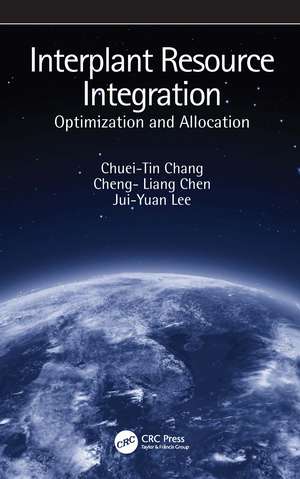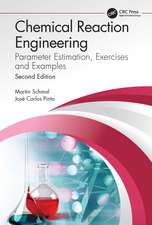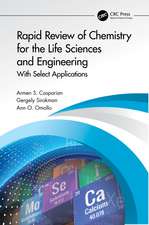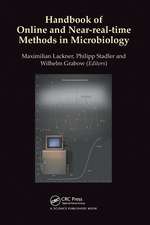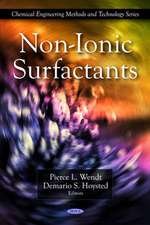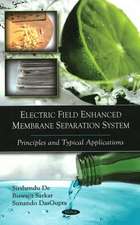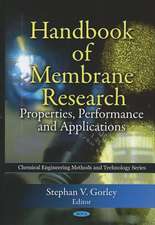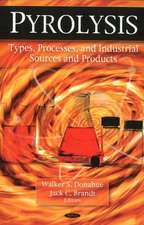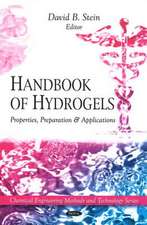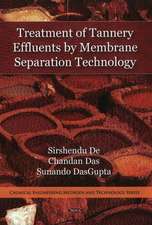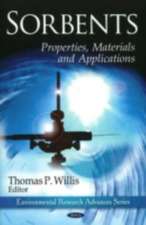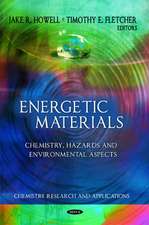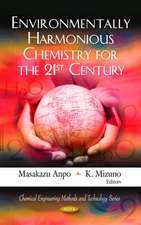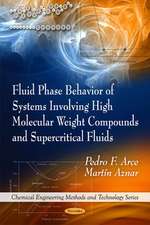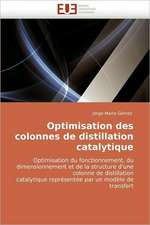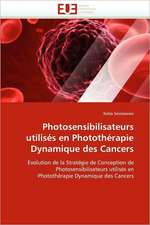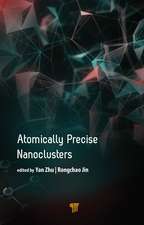Interplant Resource Integration: Optimization and Allocation
Autor Chuei-Tin Chang, Cheng-Liang Chen, Jui-Yuan Leeen Limba Engleză Hardback – 5 iul 2021
- Offers tools for gaining economic benefit and environmental friendliness
- Presents methods for realistically feasible solutions
- Provides concrete mathematical modeling procedures
- Familiarizes readers with various network synthesis approaches and shows alternative viewpoints that can be adopted to model the interactions of participating members in an interplant resource integration scheme
| Toate formatele și edițiile | Preț | Express |
|---|---|---|
| Paperback (1) | 568.28 lei 6-8 săpt. | |
| CRC Press – 25 sep 2023 | 568.28 lei 6-8 săpt. | |
| Hardback (1) | 1109.18 lei 6-8 săpt. | |
| CRC Press – 5 iul 2021 | 1109.18 lei 6-8 săpt. |
Preț: 1109.18 lei
Preț vechi: 1352.65 lei
-18% Nou
Puncte Express: 1664
Preț estimativ în valută:
212.27€ • 220.79$ • 175.24£
212.27€ • 220.79$ • 175.24£
Carte tipărită la comandă
Livrare economică 14-28 aprilie
Preluare comenzi: 021 569.72.76
Specificații
ISBN-13: 9780815346432
ISBN-10: 0815346433
Pagini: 378
Ilustrații: 424
Dimensiuni: 156 x 234 x 22 mm
Greutate: 0.45 kg
Ediția:1
Editura: CRC Press
Colecția CRC Press
Locul publicării:Boca Raton, United States
ISBN-10: 0815346433
Pagini: 378
Ilustrații: 424
Dimensiuni: 156 x 234 x 22 mm
Greutate: 0.45 kg
Ediția:1
Editura: CRC Press
Colecția CRC Press
Locul publicării:Boca Raton, United States
Public țintă
Professional Practice & DevelopmentCuprins
Introduction (CTC). Multi-Plant HEN Designs for Continuous Processes. Indirect HEN Designs for Batch Processes. Benefit Allocation Methods for Interplant Heat Integration Based on Non-Cooperative Games. Fair Benefit Allocaton to Facilitate Interplant Heat Integration Based on Cooperative Games. Multi-Plant Water Network Designs for Continuous and Batch Processes. Total-Site Water Integration Based on a Cooperative-Game Model. A Model-Based Method for Planning and Scheduling of Petroleum Supply Chain. A Decentralized Petroleum Supply-Chain Management Model for Maximum Overall Profit and Reasonable Beneft Allocation. Coordinated Supply Chain Management: Biomass.
Notă biografică
Chuei-Tin Chang received his B.S. degree in Chemical Engineering from National Taiwan University, and PhD in Chemical Engineering from Columbia University in 1976 and 1982, respectively. He worked as a process engineer in FMC Corporation (Princeton, New Jersey) from 1982 to 1985, and also as an assistant professor at the Department of Chemical Engineering in University of Nebraska (Lincoln) from 1985 to 1989. He later joined the faculty of Chemical Engineering Deparment of National Cheng Kung University (Tainan, Taiwan) in 1989, became a full professor in 1993, and recently received the Distinguished Professor Award (2008-2011). He was a visiting research scholar at Northwestern University (1992), Leihigh University (1998) and Georgia Institute of Technology (2006). He is a senior member of AIChE and TwIChE. His current research interests are mainly concerned with Process Systems Engineering (PSE), which include Process Integration, Process Safety Assessment and Fault Diagnosis, etc. He is author of 97 referreed papers and 76 conference papers (total number of citations: 1069; h-index: 15).
Cheng-Liang Chen is Professor, Department of Chemical Engineering National Taiwan University Taipei. He received his B.S., M.S., and PhD in Chemical Engineering from National Taiwan University. He served as a Board Member, China Petroleum Company from 2008–2013), Board Member, China-American Petroleum Company (2013–2017), Director, Petrochemical Research Center, NTU (2010–2016), Debuty Executive Director, Energy Research Center, National Taiwan University (2011–2013), and Debuty Executive Director, National Science and Technology Program on Energy (2011–2013).
Jui-Yuan Lee is Assistant Professor, Department of Chemical Engineering and Biotechnology, National Taipei University of Technology. Dr. Lee received his PhD in Chemical Engineering from National Taiwan University (NTU) in January 2011 and conducted postdoctoral research at NTU (March 2011–September 2013), University of the Witwatersrand, Johannesburg, South Africa (October 2013–May 2014), and National Tsing Hua University, Taiwan (July–December 2014), before joining Taipei Tech in February 2015. His research centres on chemical process integration and optimisation, with particular research interests in various energy systems. He has published 36 referred journal papers, 47 conference papers, and coedited/co-authored 2 books. Dr Lee works closely with quite a few collaborators mainly in Malaysia, the Philippines, China, and South Africa.
Cheng-Liang Chen is Professor, Department of Chemical Engineering National Taiwan University Taipei. He received his B.S., M.S., and PhD in Chemical Engineering from National Taiwan University. He served as a Board Member, China Petroleum Company from 2008–2013), Board Member, China-American Petroleum Company (2013–2017), Director, Petrochemical Research Center, NTU (2010–2016), Debuty Executive Director, Energy Research Center, National Taiwan University (2011–2013), and Debuty Executive Director, National Science and Technology Program on Energy (2011–2013).
Jui-Yuan Lee is Assistant Professor, Department of Chemical Engineering and Biotechnology, National Taipei University of Technology. Dr. Lee received his PhD in Chemical Engineering from National Taiwan University (NTU) in January 2011 and conducted postdoctoral research at NTU (March 2011–September 2013), University of the Witwatersrand, Johannesburg, South Africa (October 2013–May 2014), and National Tsing Hua University, Taiwan (July–December 2014), before joining Taipei Tech in February 2015. His research centres on chemical process integration and optimisation, with particular research interests in various energy systems. He has published 36 referred journal papers, 47 conference papers, and coedited/co-authored 2 books. Dr Lee works closely with quite a few collaborators mainly in Malaysia, the Philippines, China, and South Africa.
Descriere
The book introduces methods for interplant resource integration. It offers analytic tools to formulate mathematical programming models to maximize overall saving and devise fair distribution schemes. Superstructures of resource-exchange networks, model formulations, and corresponding allocation algorithms are given to enable practical application.
